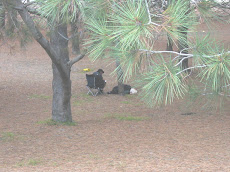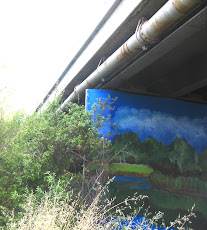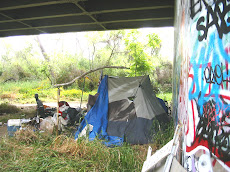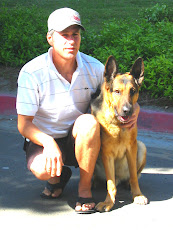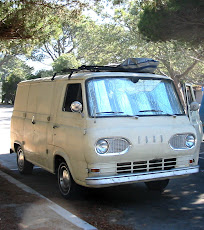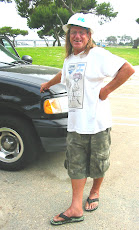Bob is a regular guy who probably had little more to say to a wife than "What's for dinner?" I don't hold that against Bob. I am only trying to say that he is free of pretense, easy-going, able to laugh at nothing, and very likable for these reasons. I admit it: I like Bob, and I do not take to homeless men generally.
Bob says his father was a cop-killer. His father claimed to have come from the belly of a snake. He knew he was a bad man, accepted it, and bragged about it and the number of cops he murdered. Bob has never killed anyone, even though he has been in a few scrapes. His father frightened him, and I remember imagining Bob as a child clinging to his mother, using her as a shield. Bob is proud, nonetheless, of his father's reputation, audacity, and arrogance. His father probably died by the gun, but Bob never got around to telling that part.
Bob drinks. He likes to drink and drinks constantly. He told me he was never going to stop drinking. Apparently, if he does not drink himself to sleep, he cannot stop thinking about his three ex-wives. He had woman problems, but I never learned how those were different from the problems other men have.
Bob used to work, too. He had worked steadily as a younger man at various types of jobs, but drinking probably got in the way as it did with the wives. By the time I met Bob, he was a confirmed alcoholic and homeless. He had already been homeless on the Bay for five years.
Before that, I did not venture to ask: Bob does not talk in a straight line; his train of thought derails here and there. Before long, he is repeating himself about what he thinks is wrong with my truck and why I need a choke installed even though I tell him the truck is fine. So talking to Bob can be tiring, and he just won't stop unless I beg out a few times over and over again that I have something else to do or must get to sleep.
Bob would walk away from my truck, still talking, only now talking to himself. He would often continue in this way into the night, talking to the Bay, to whoever was out there listening. Tired of that, too, I would roll my truck window down and ask politely, "Bob, are you talking to yourself?"
"Yeah," Bob drawled, stretching the word out as though it were a matter of fate and there were nothing he could do about it. "I'm going to bed soon." And he would. He would climb into the back of his truck.
If you recall, I was saddened in March to learn that Bob was ill. He had been diagnosed with cancer and hepatitis. He was on a stolen bicycle because his truck had been confiscated, and he was sleeping on the ground near the Long's Drugstore. That is where my story, Daffodils, ends.
Bob disappeared soon after.
Sensing something wrong after days and weeks went by without Bob, I drove the streets and allies around the drugstore. I phoned the nearest police department to ask if they might have picked up someone of Bob's description. I spoke to any policeman parked in the area in case he might have seen Bob and to every homeless person in the vicinity; but I was losing hope and feeling that much more helpless the more people of whom I inquired.
I felt guilty and selfish, too, that I could not manage to turn up any information and that I did not have the time or resources to do a full search, either by phone or in my truck. Maybe I was just rationalizing the reality that I have to work for money to feed myself, to pay off debts, and to save for a place to live. Maybe I was made selfish by the conditions of homelessness, or maybe the selfishness came first and lay at the root of my homelessness.
Bob says his father was a cop-killer. His father claimed to have come from the belly of a snake. He knew he was a bad man, accepted it, and bragged about it and the number of cops he murdered. Bob has never killed anyone, even though he has been in a few scrapes. His father frightened him, and I remember imagining Bob as a child clinging to his mother, using her as a shield. Bob is proud, nonetheless, of his father's reputation, audacity, and arrogance. His father probably died by the gun, but Bob never got around to telling that part.
Bob drinks. He likes to drink and drinks constantly. He told me he was never going to stop drinking. Apparently, if he does not drink himself to sleep, he cannot stop thinking about his three ex-wives. He had woman problems, but I never learned how those were different from the problems other men have.
Bob used to work, too. He had worked steadily as a younger man at various types of jobs, but drinking probably got in the way as it did with the wives. By the time I met Bob, he was a confirmed alcoholic and homeless. He had already been homeless on the Bay for five years.
Before that, I did not venture to ask: Bob does not talk in a straight line; his train of thought derails here and there. Before long, he is repeating himself about what he thinks is wrong with my truck and why I need a choke installed even though I tell him the truck is fine. So talking to Bob can be tiring, and he just won't stop unless I beg out a few times over and over again that I have something else to do or must get to sleep.
Bob would walk away from my truck, still talking, only now talking to himself. He would often continue in this way into the night, talking to the Bay, to whoever was out there listening. Tired of that, too, I would roll my truck window down and ask politely, "Bob, are you talking to yourself?"
"Yeah," Bob drawled, stretching the word out as though it were a matter of fate and there were nothing he could do about it. "I'm going to bed soon." And he would. He would climb into the back of his truck.
If you recall, I was saddened in March to learn that Bob was ill. He had been diagnosed with cancer and hepatitis. He was on a stolen bicycle because his truck had been confiscated, and he was sleeping on the ground near the Long's Drugstore. That is where my story, Daffodils, ends.
Bob disappeared soon after.
Sensing something wrong after days and weeks went by without Bob, I drove the streets and allies around the drugstore. I phoned the nearest police department to ask if they might have picked up someone of Bob's description. I spoke to any policeman parked in the area in case he might have seen Bob and to every homeless person in the vicinity; but I was losing hope and feeling that much more helpless the more people of whom I inquired.
I felt guilty and selfish, too, that I could not manage to turn up any information and that I did not have the time or resources to do a full search, either by phone or in my truck. Maybe I was just rationalizing the reality that I have to work for money to feed myself, to pay off debts, and to save for a place to live. Maybe I was made selfish by the conditions of homelessness, or maybe the selfishness came first and lay at the root of my homelessness.
In a pinch, in a bind of my own conscience, for want of other means, I did what other helpless, hopeless, guilty, and selfish people do: I prayed. It was desperate prayer, perhaps the only honest kind. I imagined Bob being taken in by some philanthropic type who was impressed with his good nature and could afford to handle his bad habits. I imagined Bob in a hospital getting the attention he needed by a caring staff. And, I imagined Bob getting to Las Vegas for the last sexual exploit of his life. (Bob once told me his fantasy of having a number of prostitutes sit on him since he no longer had the energy otherwise.) I could not, though, imagine Bob dead. Whether that were my intuition or merely the result of bad faith was hard to tell in the eight months that followed Bob's disappearance.
People who knew me inquired about Bob. Everybody knew how well Bob amused me, how kindly I felt toward him, and how much he seemed to trust me. He was the first homeless person to ever speak to me. We had a little homeless relationship going, but I no more knew what to do about Bob gone missing than I did about my dead dog ending up in the City dump. (That was the well-meaning fault of a neighbor who bagged my dog in a hurry so that children walking to school would not see her in the road.) In brief, I would feel guilty all over again and all the other feelings that amounted to severe self-reproach.
I guess I got over Bob. I figured he was dead in the sense that, like my dog, I would never see him again. I actually never saw my dog die. I never saw her dead body. I only heard about it. Sad to say, since I did not expect any report from anyone about Bob's whereabouts or his status dead or alive, he was dead to me for all intents and purposes. I did not love Bob the way I loved my dog, but the world was emptier without him; and, absent of Bob's ameliorating effect, homelessness took on a grimmer aspect.
Many more changes later --- from late winter turned to spring, spring to summer, summer to mild California fall, the loss of a job to finding another, having a little money to being flat broke, and so much more of the same old thing --- I was getting out of my truck on a Sunday morning at one of the nearest public washrooms. It was a cool, overcast day, pleasant and quiet without the tourists whose absence left only the dark, damp presence of Monterey pines amid the ghostly morning fog.
Out of the corner of my eye, I noticed someone approaching me. I looked, but I did not see right away and could not, for a moment, put a name on the apparition that finally spoke.
"I didn't come to see you sooner because I thought you'd be mad at me." It was the familiar drawl.
"Bob!" I grabbed his arm and looked him in the face. "What happened to you?"
"Well, I been living in John's truck, and they told me I ought to say hello. I been seeing you out here for a while."
"I looked for you at the Long's drugstore and didn't find you. Are you still living around here?"
"Oh, yeah. I had a stroke. Somebody picked me up and took me to the hospital. I was there for three weeks. When I got out, John let me sleep in his van." Bob spoke so slowly and matter-of-factly one would have thought the incident were far in the distant past. We talked for a while longer; but the day was moving ahead, and I had chores to do before I started another week of work.
The hole in the scenery of my life out here on the Bay has taken the shape of Bob once again. Bob stops by the truck to chat on occasion; and whenever I see John's van, I know Bob is ensconced in the back: he's safe, drunk, and sleeping.
People who knew me inquired about Bob. Everybody knew how well Bob amused me, how kindly I felt toward him, and how much he seemed to trust me. He was the first homeless person to ever speak to me. We had a little homeless relationship going, but I no more knew what to do about Bob gone missing than I did about my dead dog ending up in the City dump. (That was the well-meaning fault of a neighbor who bagged my dog in a hurry so that children walking to school would not see her in the road.) In brief, I would feel guilty all over again and all the other feelings that amounted to severe self-reproach.
I guess I got over Bob. I figured he was dead in the sense that, like my dog, I would never see him again. I actually never saw my dog die. I never saw her dead body. I only heard about it. Sad to say, since I did not expect any report from anyone about Bob's whereabouts or his status dead or alive, he was dead to me for all intents and purposes. I did not love Bob the way I loved my dog, but the world was emptier without him; and, absent of Bob's ameliorating effect, homelessness took on a grimmer aspect.
Many more changes later --- from late winter turned to spring, spring to summer, summer to mild California fall, the loss of a job to finding another, having a little money to being flat broke, and so much more of the same old thing --- I was getting out of my truck on a Sunday morning at one of the nearest public washrooms. It was a cool, overcast day, pleasant and quiet without the tourists whose absence left only the dark, damp presence of Monterey pines amid the ghostly morning fog.
Out of the corner of my eye, I noticed someone approaching me. I looked, but I did not see right away and could not, for a moment, put a name on the apparition that finally spoke.
"I didn't come to see you sooner because I thought you'd be mad at me." It was the familiar drawl.
"Bob!" I grabbed his arm and looked him in the face. "What happened to you?"
"Well, I been living in John's truck, and they told me I ought to say hello. I been seeing you out here for a while."
"I looked for you at the Long's drugstore and didn't find you. Are you still living around here?"
"Oh, yeah. I had a stroke. Somebody picked me up and took me to the hospital. I was there for three weeks. When I got out, John let me sleep in his van." Bob spoke so slowly and matter-of-factly one would have thought the incident were far in the distant past. We talked for a while longer; but the day was moving ahead, and I had chores to do before I started another week of work.
The hole in the scenery of my life out here on the Bay has taken the shape of Bob once again. Bob stops by the truck to chat on occasion; and whenever I see John's van, I know Bob is ensconced in the back: he's safe, drunk, and sleeping.

 er, almost anything but that.
er, almost anything but that.





